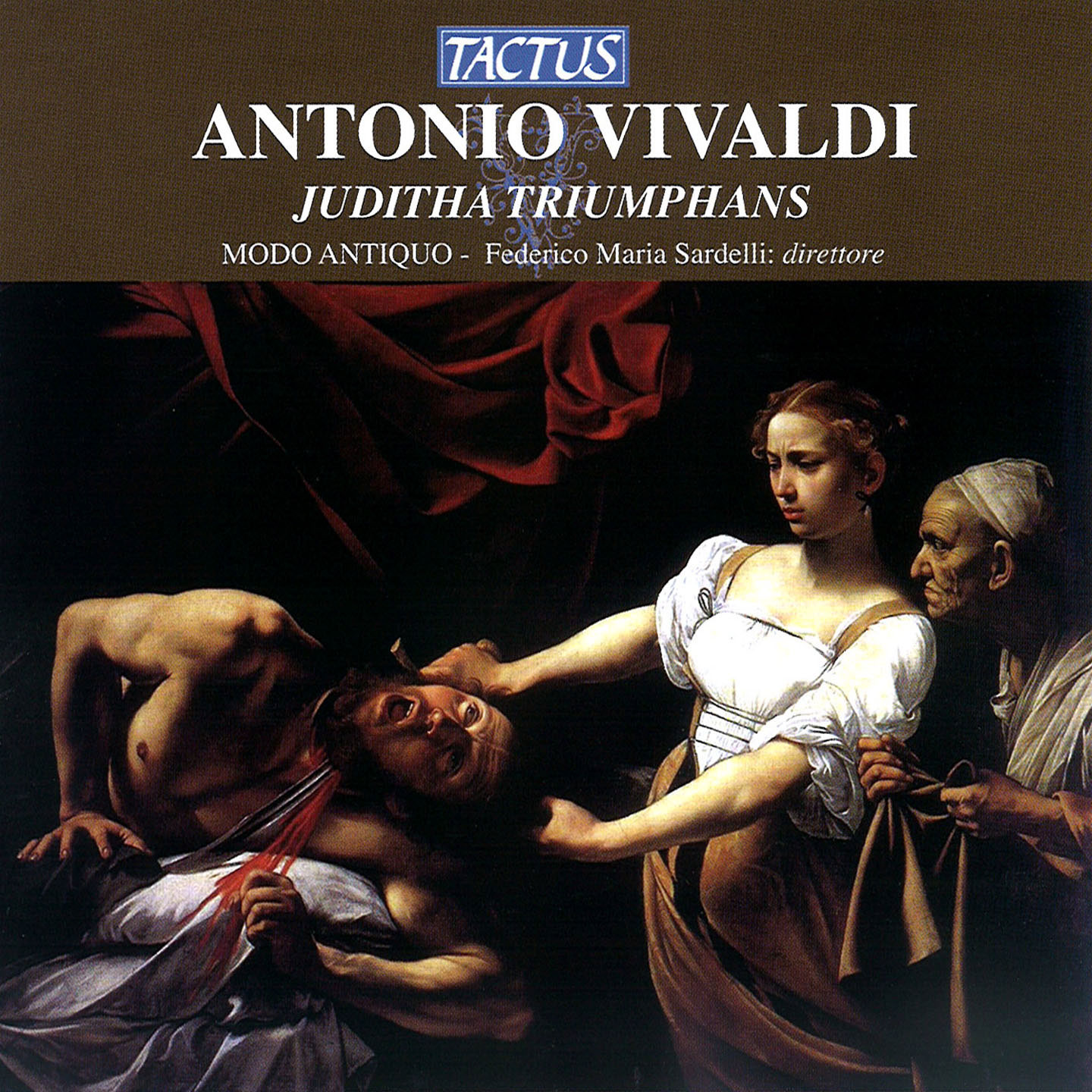Antonio Vivaldi (1678-1741)
Bethulia/Corfù, besieged by a Holofernes/Alì Pascià, is triumphantly liberated by Judith/Venice who, thanks only to the tardy but decisive alliance with Austria, becomes (in the allegorical geometry of the oratorio) the symbol of Christian unity, embodied by the high priest Ozias.
Coincidentally, in those years, when the position of Maestro di Coro had become vacant (between the departure of Gasparini in 1713 and the appointment of Pietra Grua in 1719), Vivaldi, then Maestro de’ Concerti at the Ospedale della Pietà, was also entrusted with composing sacred music for use by the institution.
Thus the task of celebrating in music the triumph of Venice fell to Vivaldi.
Conservative and avant-garde at the same time, the Pietà taught and featured the newest and most unusual instruments on the musical scene: thus the variegated orchestra of Juditha included the newborn clarinet alongside the now obsolete viola da gamba (called “Viole all”Inglese”, or English viols), and the viola d’amore appeared next to the rare chalumeau.
In order to express in music the magnificence of the celebratory event, Vivaldi chose to exploit all the shades of the extraordinary palette of timbres offered by the Pietà: recorders, oboes, clarinets, chalumeau, trumpets, timpani, organ, mandolin, viola d”amore, four theorbos, five viola da gambas, and strings, in addition to the five vocal soloists and choir.
Of the four oratorios which we know Vivaldi to have written, Juditha is the only one surviving.
We cannot, for example, know whether Moyses Deus Pharaonis, performed at the Pietà in 1714, called for equally colorful forces.
Tracklist
Vivaldi, Antonio
Juditha triumphans devicta Holofernes barbarie, RV 644
1 - Part I: Arma, caedes (Chorus) (3:39)
2 - Part I: Recitative: Felix et fausta dies (Holofernes) (0:47)
3 - Part I: Aria: Nil arma, nil bella (Holofernes) (3:09)
4 - Part I: Recitative: Mi dux, Domine mi (Vagans, Holofernes) (0:29)
5 - Part I: Aria: Matrona inimica (Vagans) (4:13)
6 - Part I: Recitative: Huc accedat Matrona (Holofernes) (1:13)
7 - Part I: Aria: Quo cum Patriae (Juditha) (4:13)
8 - Part I: Ne timeas non (Abra) (0:14)
9 - Part I: Aria: Vultus tui vago splendori (Abra) (2:38)
10 - Part I: Vide, humilis prostrata (Abra) (0:36)
11 - Part I: O quam vaga (Chorus, Abra) (1:17)
12 - Part I: Recitative: Quem vides prope (Vagans, Holofernes, Juditha) (0:30)
13 - Part I: Aria: Quamvis ferro (Abra) (3:03)
14 - Part I: Quid cerno! Oculi mei stupidi (Holofernes) (1:50)
15 - Part I: Aria: Quanto magis generosa (Juditha) (7:28)
16 - Part I: Recitative: Magna, o foemina petis (Holofernes, Juditha) (1:06)
17 - Part I: Aria: Sede, o cara (Holofernes) (3:00)
18 - Part I: Tu Judex es, tu Dominus, tu potens (Holofernes, Juditha) (1:35)
19 - Part I: Aria: Agitata infido flatu (Holofernes) (3:18)
20 - Part I: Recitative: In tentorio supernae (Holofernes, Vagans) (0:32)
21 - Part I: Aria: O servi volate (Vagans) (2:43)
22 - Part I: Tu quoque hebraica ancilla (Vagaus) (0:44)
23 - Part I: Aria: Veni, veni, me sequere (Juditha) (6:47)
24 - Part I: Recitative: Venio Juditha (Abra) (0:18)
25 - Part I: Aria: Fulgeat sol frontis (Abra) (4:25)
26 - Part I: Recitative: In urbe interim (Abra) (0:37)
27 - Part I: Mundi Rector (Chorus, Abra) (3:21)
Disco n.2
Vivaldi, Antonio
1 - Part II: Recitative: Summi Regis in mente (Ozias) (1:04)
2 - Part II: Aria: O Sydera, o stellae (Ozias) (5:16)
3 - Part II: Recitative: Iam saevientis in hostem (Ozias, Holofernes) (0:58)
4 - Part II: Aria: Nox obscura (Holofernes) (6:32)
5 - Part II: Belligerae meae sorti (Holofernes) (1:16)
6 - Part II: Aria: Transit aetas (Juditha) (4:30)
7 - Part II: Recitative: Haec in crastinum (Holofernes, Juditha) (0:39)
8 - Part II: Aria: Noli o cara (Holofernes) (5:44)
9 - Part II: Recitative: Tibi dona salutis (Juditha, Holofernes) (0:22)
10 - Part II: Plena nectare non mero (Chorus) (1:22)
11 - Part II: Recitative: Tormenta mentis tuae (Holofernes) (0:27)
12 - Part II: Aria: Vivat in pace (Juditha) (3:50)
13 - Part II: Sic in Pace inter hostes (Juditha) (0:46)
14 - Part II: Umbrae carae, aurae adoratae (Vagaus) (5:58)
15 - Part II: Quae fortunata es tu vaga Matrona (Vagaus) (1:59)
16 - Part II: Aria: Non ita reducem (Juditha) (3:27)
17 - Part II: Jam pergo, postes claudo (Abra) (0:24)
18 - Part II: Recitative: Summe Astrorum Creator (Juditha) (1:14)
19 - Part II: Aria: In somno profundo (Juditha) (5:13)
20 - Part II: Recitative: Impii, indigni Tiranni (Juditha) (0:44)
21 - Part II: Recitative: Abra, Abra accipe munus (Juditha, Abra) (0:36)
22 - Part II: Aria: Si fulgida per te (Abra) (4:09)
23 - Part II: Jam non procul ab axe (Vagaus) (1:24)
24 - Part II: Aria: Armatae face (Vagaus) (3:03)
25 - Part II: Quam insolita luce (Ozias) (1:14)
26 - Part II: Gaude felix Bethulia laetare (Ozias) (3:44)
27 - Part II: Ita decreto aeterno (Ozias) (1:06)
28 - Part II: Salve invicta (Chorus) (1:56)
- Composer: Antonio Vivaldi (1678-1741)
- Performers: Modo Antiquo
Juditha – Barbara Di Castri: mezzosoprano
Holofernes – Licia Sciannimanico: mezzosoprano
Vagaus – Nicki Kennedy: soprano
Abra – Alessandra Rossi: soprano
Ozias- Rowena Anketell: mezzosoprano
Coro da Camera Italiano, Roma
Federico Maria Sardelli: conductor - Musicological Text: Federico Maria Sardelli
- Historical Period: Late Baroque
- Code: TC 672290
- Edition: 2002
- Barcode: 8007194200102
- Set: 1
- Total tracks: 55
- Total duration: 02:11:25
- Notes: Historical instruments – 2CD box set
- Texts: Juditha Triumphans – Oratorio for soli, chorus and orchestra – RV 644







